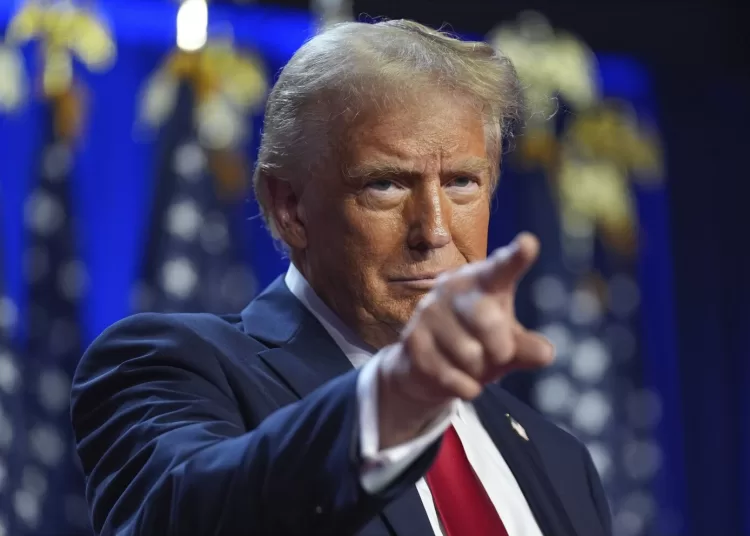New York – Ahmed Abdel Samie
In a historic political victory, Donald Trump has won a second non-consecutive term in the White House, overcoming Democratic challenger Vice President Kamala Harris. This momentous win cements Trump’s place in U.S. history as the second president, after Grover Cleveland, to achieve this feat. Furthermore, Trump’s victory marks him as the only president to defeat two female opponents in presidential elections—Hillary Clinton in 2016 and Kamala Harris in 2024—solidifying his legacy as one of the most formidable political figures of his generation.
Trump’s historic comeback and vision for America’s future
Trump delivered a powerful victory speech from Florida, where he declared the triumph as “the greatest political comeback in American history.” He promised to restore America’s global standing, resolve long-standing international conflicts, and continue his vision of national renewal. “America is entering a golden era,” Trump proclaimed, emphasizing the broad political movement that propelled his campaign. His slogan, “Make America Great Again,” is poised to guide his administration into a second term marked by ambition and action.
The 47th president’s journey back to the White House began years ago with a vision that defied conventional political norms. Trump’s return to power signals not only the continuation of his America-first approach but also a renewed commitment to addressing domestic issues such as illegal immigration, economic growth, and job creation.
Early life and career
Born on June 14, 1946, in Queens, New York, Donald John Trump was raised in a family that prioritized business and real estate. His father, Fred C. Trump, was a prominent real estate developer, and under his guidance, Donald began to develop his business acumen early on.
Trump’s childhood was steeped in discipline and business, values his father instilled in him from a young age. At the age of 13, Trump was sent to the New York Military Academy, where he learned leadership and resilience—qualities that would become central to his political career.
Education and early professional career
After earning a degree in economics from the Wharton School at the University of Pennsylvania in 1968, Trump took the reins of his father’s real estate business. He expanded the company’s reach into markets beyond New York City, establishing a reputation as an ambitious and innovative developer.
By the 1980s, Trump’s name was synonymous with high-profile projects such as Trump Tower and Trump Plaza, luxury landmarks in New York City. He also made significant forays into the casino industry, acquiring several properties in Atlantic City, including the Trump Taj Mahal, which became one of his signature ventures.
Trump’s business ventures extended beyond real estate, including investments in golf courses, consumer goods, and media. His role as the owner of the Miss USA and Miss Universe pageants from 1996 to 2015 added to his public profile, but it was his role as the host of the reality show *The Apprentice* that solidified his celebrity status.
Path to the presidency
Trump’s 2016 presidential campaign, built on the slogan “Make America Great Again,” resonated with millions of Americans, propelling him to victory against Democratic nominee Hillary Clinton. His term as the 45th president was marked by bold economic policies, including tax cuts, deregulation, and a focus on energy independence. Unemployment reached historic lows, and the stock market saw significant gains during his administration.
Trump’s foreign policy achievements included the renegotiation of trade deals, such as the United States-Mexico-Canada Agreement (USMCA), and the normalization of relations between Israel and several Arab nations through the Abraham Accords. Domestically, Trump appointed three conservative justices to the U.S. Supreme Court, reshaping the judiciary for years to come.
Setbacks and resilience
Despite his successes, Trump’s career was not without its challenges. In the 1990s, his business empire faced significant financial difficulties, leading to bankruptcies in some of his casino ventures. However, Trump managed to use bankruptcy laws to restructure his companies and emerged from these setbacks with his reputation largely intact.
His resilience in overcoming these obstacles became a defining characteristic of his political persona, inspiring a loyal base of supporters who admired his ability to weather adversity.
Foreign and domestic policy
Trump’s second presidential campaign focused on resolving ongoing international conflicts, including the wars in Gaza and Ukraine, as well as the nuclear threat posed by Iran. His stance on China, NATO, and North Korea also featured prominently in his foreign policy rhetoric. Domestically, Trump promised to continue his tough stance on illegal immigration, emphasizing the need for stronger border enforcement and crackdowns on gang violence.
On social issues, Trump’s position on abortion shifted, with a more states-rights-based approach, reflecting his broader belief in limiting federal government intervention in certain areas.
A Vision for america’s future
As Trump prepares for his second term, he has reiterated his commitment to an “America First” policy agenda. Whether tackling economic issues, strengthening America’s global position, or addressing domestic concerns such as illegal immigration and crime, Trump remains focused on maintaining and expanding his vision of a renewed and prosperous United States.
Trump’s victory in 2024 underscores his enduring appeal among his supporters, who see him as a leader capable of navigating the complexities of modern geopolitics and restoring American exceptionalism. As the U.S. enters a new chapter under his leadership, many anticipate the next phase of his political journey will be defined by bold reforms, continued economic growth, and a relentless pursuit of American interests both at home and abroad.






Discussion about this post